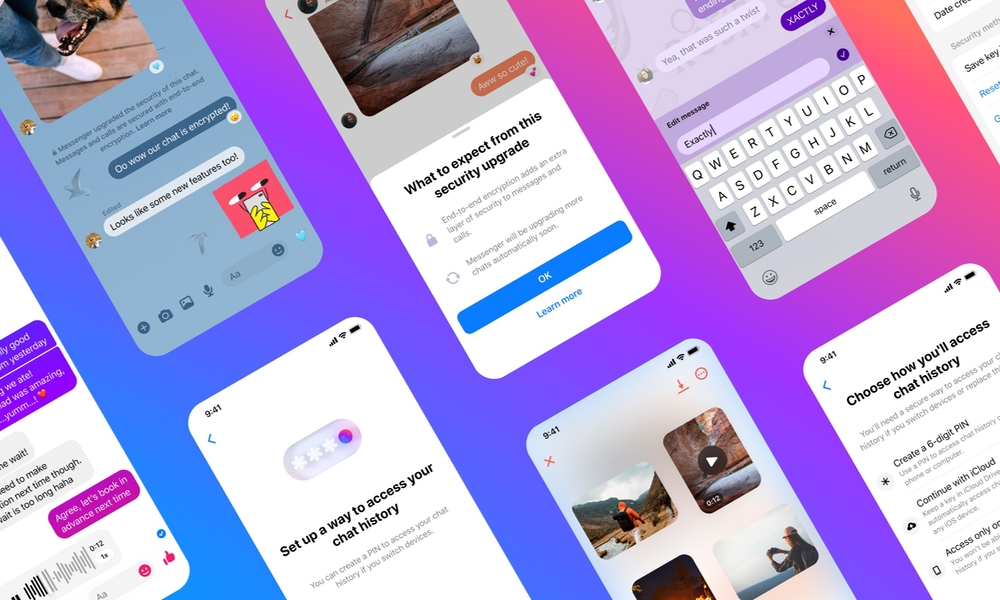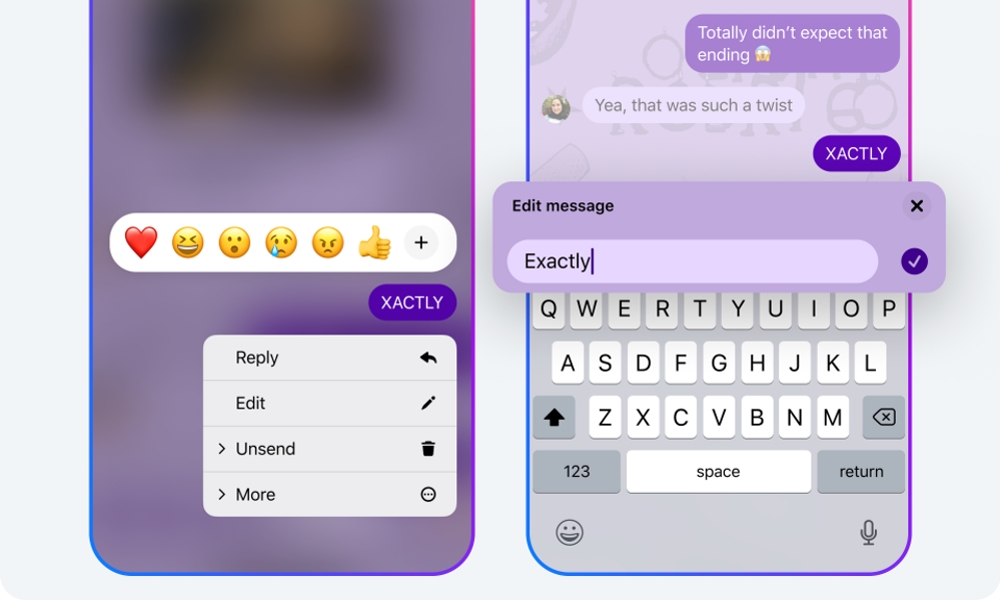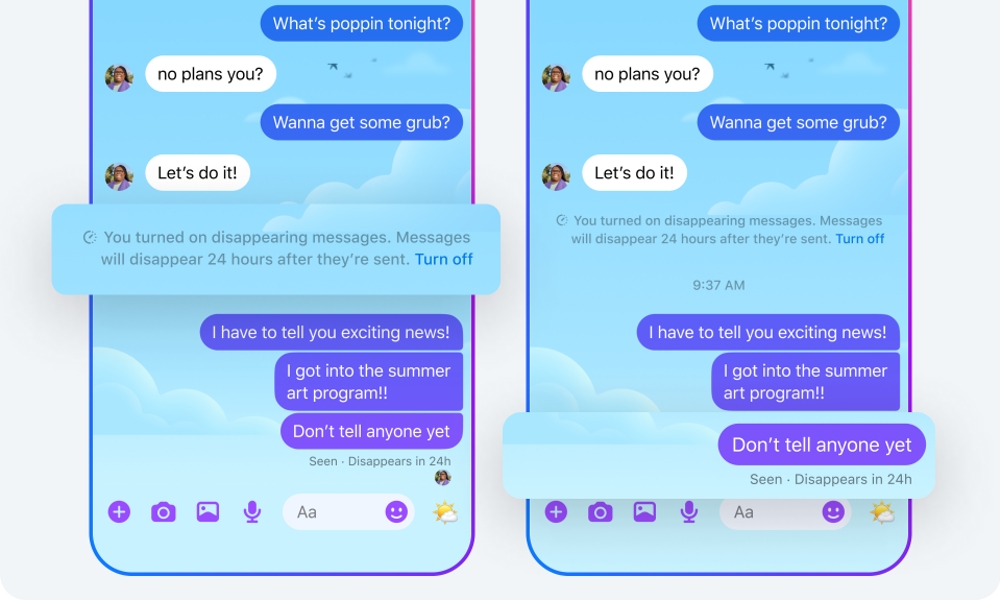Facebook Messenger Is Getting These Huge Upgrades

Toggle Dark Mode
Your conversations on Facebook Messenger are about to get much more secure. Starting today, Meta is rolling out end-to-end encryption as the default for all personal messages and calls across the social media messaging platform.
This will bring Facebook Messenger in line with Meta’s other popular messaging service WhatsApp, which has used end-to-end encryption by default since 2016. Apple’s iMessage has used end-to-end encryption since the day it went live in 2011.
To be fair, Messenger has supported end-to-end encryption for about the same length of time. The only problem is that it’s been an optional feature. Users had to turn it on if they wanted to use it, and most folks didn’t bother, leaving all their personal conversations on the platform readable on Meta’s servers.
However, in a recent blog post, Meta’s Messenger chief, Loredana Crisan, announced that the platform will now be making end-to-end encryption the default for all users, both for chats and voice and video calls.
Today I’m delighted to announce that we are rolling out default end-to-end encryption for personal messages and calls on Messenger and Facebook, as well as a suite of new features that let you further control your messaging experience. We take our responsibility to protect your messages seriously and we’re thrilled that after years of investment and testing, we’re able to launch a safer, more secure and private service.Loredana Crisan, Head of Messenger
In explaining why this has taken so long, Crisan adds that it wanted to take its time to get this right. Even though WhatsApp has had the feature for nearly as long, it’s important to remember that it’s an entirely different platform and not even one that Meta built on its own — it acquired the other messaging service in 2014, and it’s generally been run as a separate subsidiary of the larger Facebook organization.
Crisan also notes that the Messenger team “worked closely with outside experts, academics, advocates and governments to identify risks and build mitigations to ensure that privacy and safety go hand-in-hand.”
In addition to default end-to-end encryption, Facebook Messenger is gaining several other new features that will help bring it on par with iMessage and WhatsApp.
Editing Messages
Editing sent messages is one area in which Apple beat both WhatsApp and Facebook Messenger to the punch. In iOS 16, iMessage gained the ability to both edit and unsend messages, and while the other services had the latter, the editing capability was novel on Apple’s part.
Apple stuck its neck out a bit in taking the lead on this one, sparking concerns from domestic safety advocates who felt that the feature could be used for “gaslighting” victims and other similarly nefarious behavior. As a result, Apple tightened things up a bit, reducing time limits on how long a message could be unsent or edited, how many times a message could be edited, and adding an edit history so the recipient could see the changes that were made.
WhatsApp followed suit by adding these editing features earlier this year, although without all the same restrictions that Apple put in place. Specifically, while WhatsApp has the same time limits, recipients can’t see the edit history. Instead, they can report a potentially abusive message to WhatsApp.
Now, it appears Facebook Messenger will take a similar approach in adding a message editing feature.
You can now edit messages that may have been sent too soon, or that you’d simply like to change, for up to 15 minutes after you send them. You can still report abuse in an edited message and Meta will be able to see the previous versions of the edited message. Loredana Crisan, Head of Messenger
Disappearing Messages
Facebook Messenger is also improving its disappearing messages feature. The old Vanish Mode is no longer supported, but you can send disappearing messages in an end-to-end encrypted chat that will go away 24 hours after they’ve been sent.
As Crisan says, “this will help people be confident that their messages stay secure and won’t stick around forever.” It’s designed primarily for sharing temporary information of a sensitive nature, and Messenger will notify the sender if it detects someone taking a screenshot of a disappearing message.
To prevent abuse, disappearing messages can still be reported like any other conversation, and they won’t disappear from Meta’s moderators in that case, even if they do eventually vanish from your own conversation thread.
Take Control of Your Read Receipts
Although iMessage has long allowed you to decide who you want to send read receipts to, other services like Facebook Messenger leave the floodgates open.
However, that’s about to change, with a new “read receipt control” feature that lets you decide if you want others to know you’ve read their messages.
We know people value their privacy, and this feature gives you the ability to feel less pressure to respond immediately. Loredana Crisan, Head of Messenger
Photo, Video, and Voice Messages
Photos and videos sent in Messenger will soon arrive in higher quality. Although Crisan doesn’t offer any specifics, she said, “we’re currently testing HD media and file sharing improvements with a small group of users and plan to scale them in the coming months.”
Messenger is also making it easier to access photos and videos and adding fun new layouts and reactions for media in a collection.
Meanwhile, voice messages will now be playable at 1.5x or 2x speeds, and you can pick up listening to a longer voice message later on from where you left off, even after reopening the app and returning to the conversation.
When’s It All Coming?
The new changes to Facebook Messenger are rolling out gradually, so you may not see them all in your app right away. Many of the new capabilities are also only available in end-to-end encrypted conversations, so they won’t appear until those have been upgraded.
You’ll know when that’s happened because you’ll be prompted to set up a PIN or other recovery method to help you access your messages when you change devices or add a new one to your account. Remember, once your chats are end-to-end encrypted, even Meta can’t recover them for you.
This is the biggest set of improvements to Messenger since it was first launched in 2011. I’m proud of what Messenger has become: a fast and reliable service, with enjoyable features and strong safety tools, and now with the added privacy and security of end-to-end encryption.Loredana Crisan, Head of Messenger
Crisan adds that, with over a billion Messenger users, “not everyone will get default end-to-end encryption right away.” It’s going to take several months to complete the global rollout, so if you’re not seeing any changes yet, you’ll have to be patient and wait your turn.









